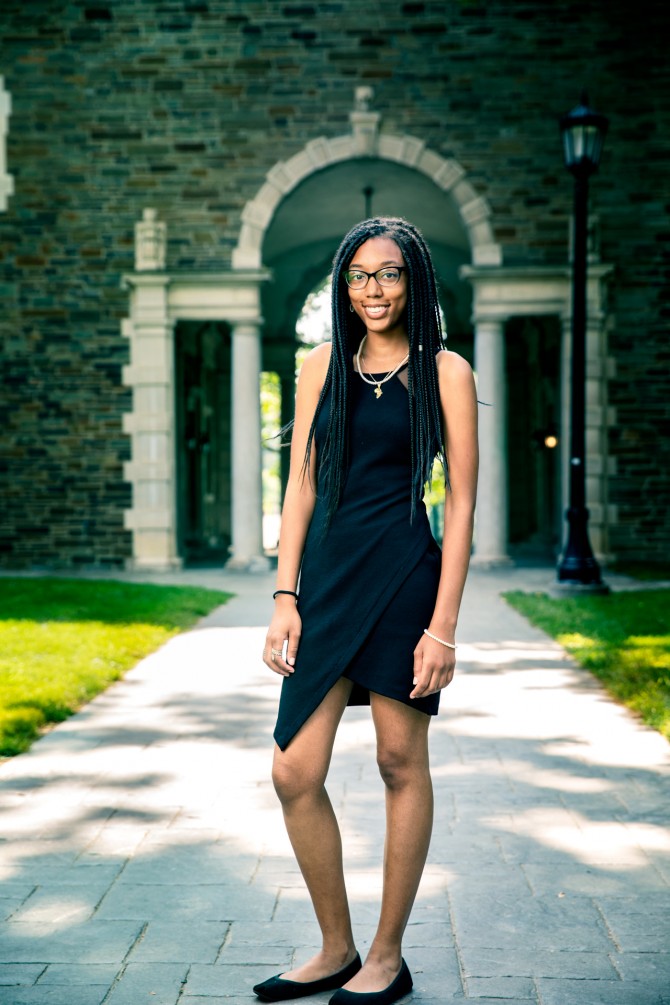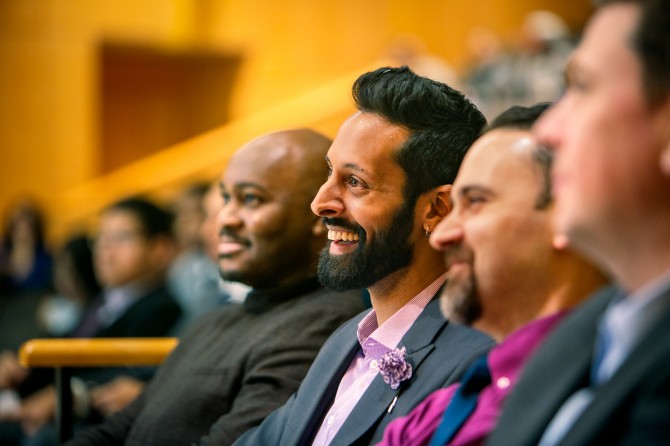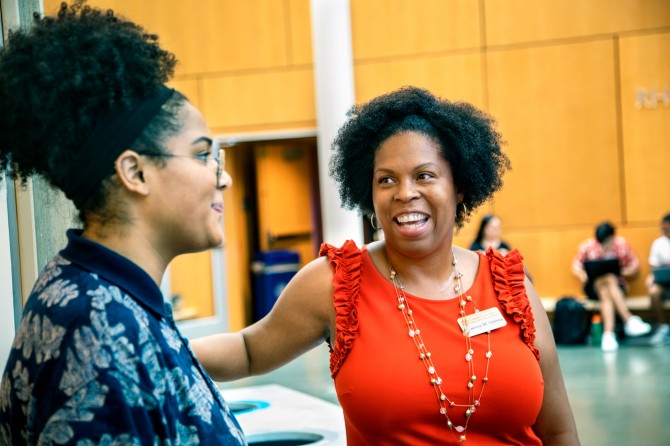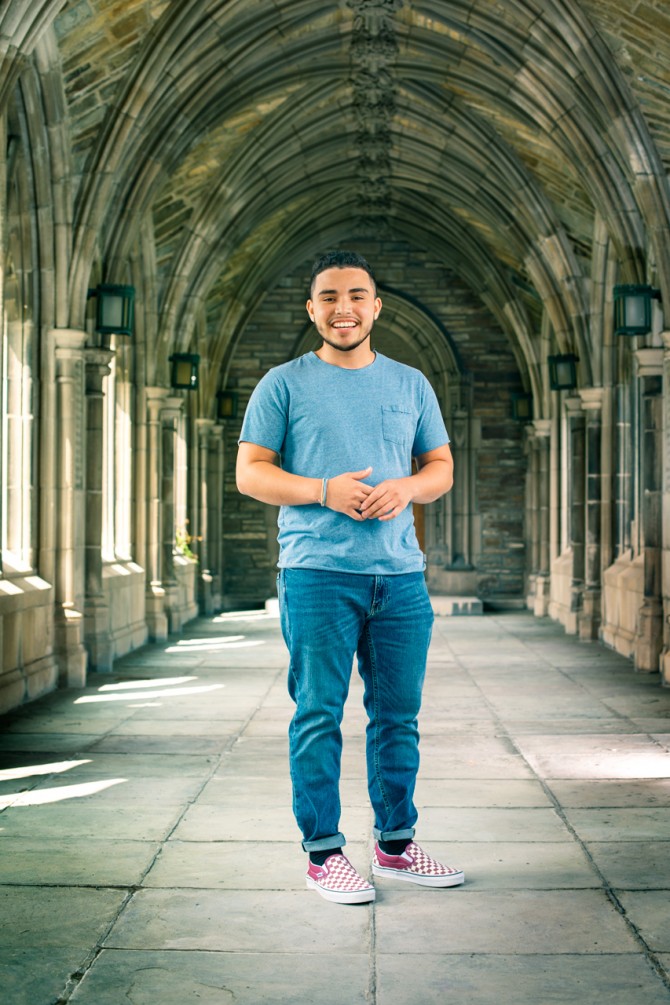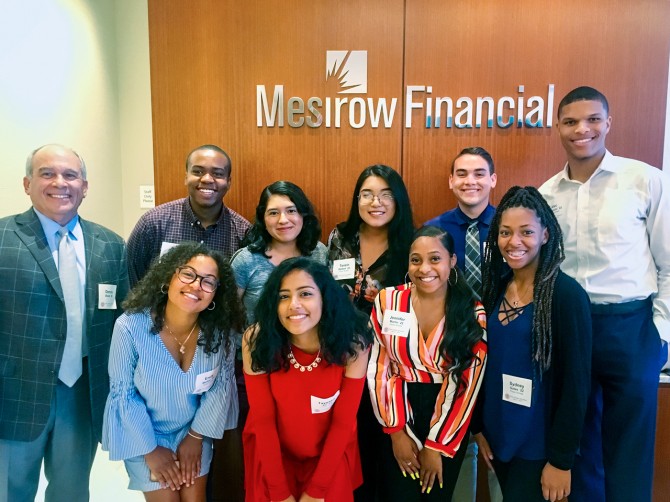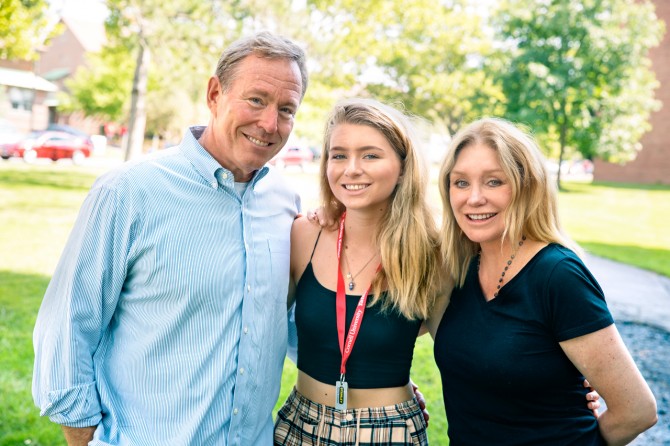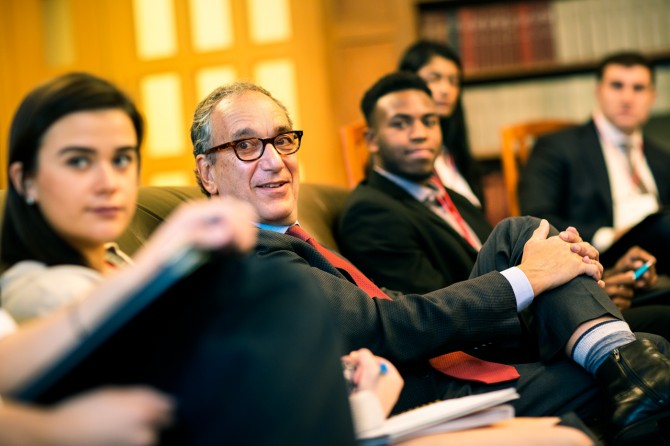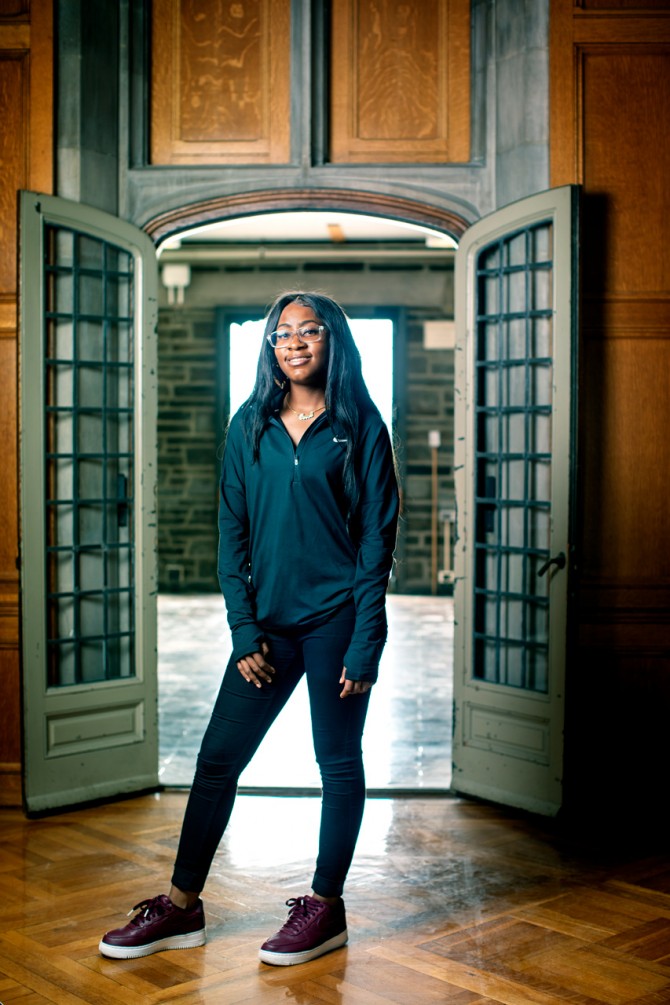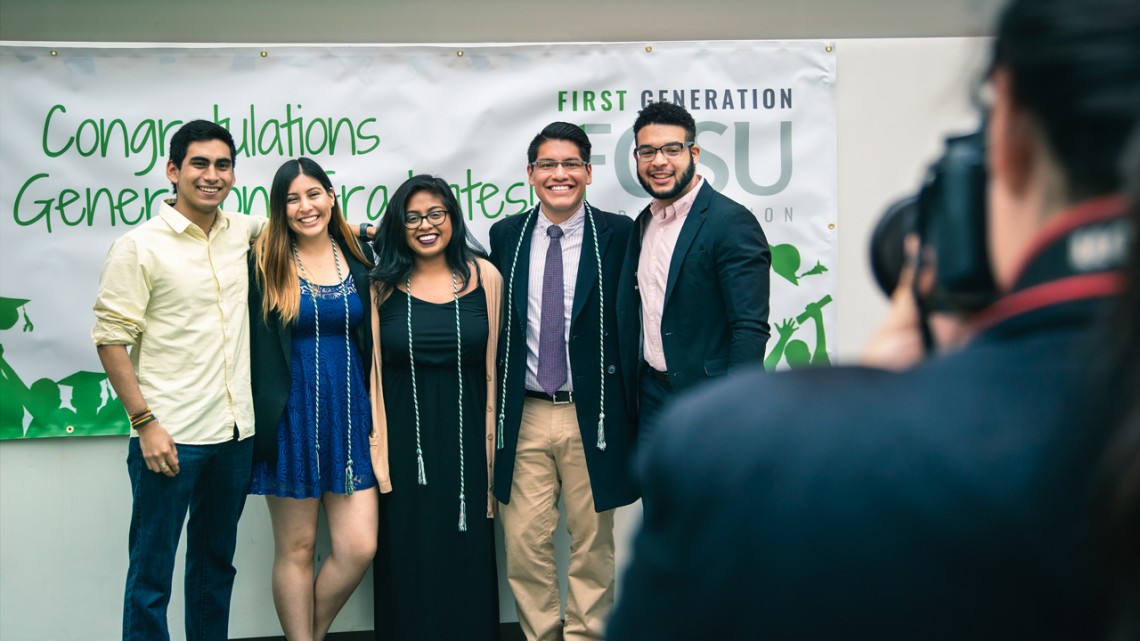
Picture-taking during the first-generation student commencement celebration in 2017.
The ‘first-gen’ experience at Cornell
By
Jaylexia Clark ’19, an ILR School student, says she “almost did not come to Cornell because my parents did not go to college and did not know how financial aid worked.
“I knew that tuition was more than my mom earned in a year, and I didn’t know who to ask,” she explains. “Then I received a call from a senior in ILR who worked closely with the admissions team and found out that Cornell would provide full financial aid. Immediately following the call, I accepted my invitation to attend.”
Clark says that during her first year, she didn’t realize that “you could go to office hours and just talk to a professor about your struggles with the course or [about] career goals. The only reason I was able to overcome my fear and gain the confidence to reach out to esteemed faculty was because of my adviser in the Pre-Professional Programs in OADI (Office of Academic Diversity Initiatives), Kristen Green.” Green herself had been a first-generation college student, and would respond to Clark’s expressions of doubt with a “Why not?” or “Why can’t you?” – a rhetorical reminder to stop telling herself, “I can’t.”
Throughout Cornell’s history, many of its students have been of the first generation in their families to earn a baccalaureate degree. Today, Cornell is increasing its efforts to support first-generation students within a wider framework of diversity, inclusion and campus climate initiatives. These efforts – to increase access to higher education and improve the entire undergraduate experience for first-generation and low-income students – benefit all students, Cornellians and the country as first-generation students become alumni and make their mark in the world and in their communities.
What’s new in first generation
From its inception, Cornell has been committed to accessibility, embodied, in part, in “… any person … any study.” The university is part of a long-term trend in the U.S. higher education system of rejecting homogeneity in favor of compositional diversity in the student population. National discussion of higher education includes scrutiny of its value to society, including who should benefit. Cornell is making investments that preserve opportunity on a welcoming campus, including for low-income and first-generation students – a commitment that continues to define the university.
As part of a campus diversity and inclusion initiative, Cornell has hired into the Office of the Dean of Students new staff who seek to represent and assist first-generation students, low-income students and student veterans; to offer peer-to-peer counseling and conflict resolution services; and to provide undocumented and DACA student support.
Vijay Pendakur, the Robert W. and Elizabeth C. Staley Dean of Students, says: “A huge part of a modern college education is giving students a chance to engage with not just ideas of difference, but also [with] people and experiences of difference. As Cornell continues to invest in greater and greater compositional diversity, we’re actually investing in a richer education for our students.”
Shakima Clency, associate dean of students for student empowerment and director of first-generation and low-income student support, can relate, having been a first-generation student, first at Alfred University and then at Canisius College where she earned her master’s degree. She felt a career pull toward the world of student and academic affairs, where her professional work continues to be informed by her “lived experiences.”
“At the time, there wasn’t a whole lot of attention and focus [on] first-generation college students – it wasn’t something that was talked about, and it wasn’t something that was considered a ‘prideful’ label,” she says. But, she adds, “nationally, the conversation about ‘first-gen’ students has exploded. More and more institutions are paying attention to students from historically marginalized backgrounds.”
At Cornell, a first-generation student is defined as a domestic student whose parents did not attain a bachelor’s degree – the definition of the U.S. Higher Education Act of 1965, which determines federal funds supporting first-generation students. For research purposes, the U.S. Department of Education also may evaluate data about parents having completed any degree, such as an associate degree, or any coursework beyond high school.
Statistics from Cornell’s Undergraduate Admissions Office show that the Class of 2022 comprises 13.7 percent first-generation students, while the Class of 2021 was 12.9 percent and the Class of 2020 was 11.3 percent. According to the Chronicle of Higher Education’s Almanac of Higher Education (2017-18), in the fall of 2016, 18.8 percent of first-year students at four-year colleges in the United States were first-generation students.
Challenges
First-generation students, some of whom also may be low-income students, arrive on a campus that, in many ways, Pendakur says, “is not designed for them,” referring to the subtle, often hidden ways in which a place like Cornell can be structured and organized along lines familiar only to people from a certain kind of background. The inequities may seem small, but they can be insidious and found throughout the student experience. For example, an instructional model in which a faculty member lectures at a podium and students sit quietly taking notes and then are evaluated only by one or two papers and finals, is a style of teaching and learning that research has proven primarily favors students who attended a narrow band of elite K-12 institutions.
Pendakur says that students “benefit from having spaces in which to be themselves; to see leadership staff, other students and even artwork that looks like them; and to put down the book and the ‘mask’ for a while.
“We have the opportunity to work with partners across campus to rethink and shape the learning environment here at Cornell so that students can thrive everywhere and the need for these kinds of ‘home bases’ will lessen,” he says.
For students without a background that includes familiarity with higher education, dealing with many different administrative steps, offices and processes required to get business done, as well as the language of college itself, can present challenges.
“Navigating the financial aid process, navigating the admissions process, navigating signing up for housing [all] could be overwhelming for a 17-year-old who hasn’t had to do that in the past,” Clency offers. “Not having parents or family members as familiar with that process could make it more challenging. On top of that, in higher education, we use a lot of terminology that is completely foreign: ‘the bursar’s office,’ ‘the registrar’s office,’ ‘carrying 18 credits.’ That terminology is unique to the college experience; they would not have heard it in high school.”
In addition, going off to college is an experience infused with emotion, from excitement to fear and apprehension. For a first-generation student, “walking onto a college campus and maybe not seeing someone who looks like you, or not feeling like you have similar experiences, social experiences, is also challenging,” Clency says.
Clency’s role also includes creating campus partnerships and increasing awareness of services that allay the extra financial stresses for low-income students who, for example, may not be able to go home during school breaks or know how they will eat when dining hall hours are reduced.
An array of partners and programs
Together with other dean of students staff, Clency is connecting with OADI and numerous student groups and college-based programs in support of diversity, inclusion and low-income and first-generation students. She is extending herself to faculty and staff as a resource to raise visibility and awareness across campus for what she calls “wrap-around support – comprehensive support that is grounded in the identity consciousness of the students who we are attempting to serve.”
Many of these groups and programs also are expanding their diversity and inclusion efforts.
OADI is a home for opportunity programs, including the Posse Scholars program, which sends promising high school students to top-tier colleges in a supportive “cohort”; Pre-Professional Programs, or P3, which supports underrepresented and/or economically disadvantage students in STEM fields; and the McNair Scholars Program, preparing students for doctoral programs.
In August 2017, OADI launched the “I’m First!” campaign to identify first-generation staff and faculty and bring them together with current first-generation students to talk about shared experiences, strategies to face challenges, and ideas for supporting students.
College investment and innovation also is deeply critical to a campus partnership for student support. The College of Arts and Sciences recently increased its efforts to support first-generation students by creating a Summer Scholars Institute (a one-week residential experience), small-group advising seminars, and a guaranteed summer internship for sophomores called the Pathways Internship Program. In tribute to the deanship of Gretchen Ritter ’83, alumni, parents, staff and friends of the college created the Gretchen Ritter ’83 First Generation Scholarship Fund.
“As a first-generation student myself, I know how challenging it can be to come to Cornell without having had access to the same resources as other students,” says Eileen Nugent ’75, partner at law firm Skadden, Arps, Slate, Meagher & Flom and a member of the Arts and Sciences Advisory Council. “I’m thrilled that the college is taking such meaningful steps to support first-generation, low-income students, and I’m grateful for Gretchen’s leadership, deep understanding and care for the issues these students face.”
The First Generation Student Union, a student-run organization, advocates for their peers and holds a graduation ceremony just to celebrate them. Cornell is also a participant in 1vyG, an all-Ivy First-Generation Students’ Conference founded at Brown University in 2015.
From the first-gen student perspective
Jaylexia Clark, a McNair scholar and a P3 scholar, is actively supporting her first-gen peers. “I am the president of the Minority ILR Student Organization and the former president of Black Students United, both student-run organizations that create specific programs geared toward supporting and uplifting first-generation students,” she says.
However, in Clark’s view, there is still not enough support to go around; programs are limited in the number of participants who can take advantage of them. “All of the work is being done by a small group of administrators or student organizations,” she says. Many programs “do not provide comprehensive services, or start too late in the student’s career trajectory. We need programs that start recruiting and supporting students as soon as they step on campus their first year.”
Shanee Moodie ’20, a student in urban and regional studies in the College of Architecture, Art and Planning, adds: “Cornell doesn’t have to cradle students, but could be better with guiding.” She says that among the barriers to accessing help is the fact that students are not sure or aware that others are probably experiencing the same types of challenges, and many do not allocate time to seek and take advantage of services.
What is the best advice she would give a student? “Ask, and do your research,” she says. “And question your emotions every time you feel alone, because 98.9 percent of the time someone is going through the same thing and you guys can get help together.”
ILR student Tyler Rodriguez ’21 agrees, saying that not knowing what services exist is the biggest barrier. “I still am not aware of all the resources available,” he says. “It can be an overwhelming environment wherein a lot of other students seem to know what they’re doing and who to talk to. I have learned that it’s important to speak up or ask if you don’t.”
Stakes are high
“Cornell students go on to work in – and lead – organizations,” Pendakur says. “Being able to put people into the world who are enriched by cross-cultural experiences who then go on to exert leadership power, I think is also a way of contributing to the greater good in a responsible way.”
George Scangos ’70 agrees. The CEO and director of Vir Biotechnology and a Cornell trustee, Scangos has made a career in the pharmaceutical, biomedical and biotechnology industries and was asked to give the 2016 Hatfield Lecture at Cornell. His recent gift to support first-generation and low-income students is helping to fund Clency’s position.
“The future leaders and major contributors to our society do not just come from the upper 10 percent of the economy,” Scangos says. “They come from everywhere – all ethnicities, financial backgrounds and social strata. My grandparents emigrated from Greece with no formal education. My father attended a junior college and received an associate degree in accounting. My mother did not attend any college. I attended Cornell in the late ’60s, during a period of unrest and demonstrations, and of course much of the diversity of the university and the society was highlighted in the various demonstrations of that time.
“As an Ivy League institution without Ivy League pretensions, Cornell is in a position to educate a heterogeneous group of students from different backgrounds,” Scangos says. “Students who come from low-income families or families without generational knowledge of higher education should find a home at Cornell, and Cornell should do all that it can to help those students be successful. The success that those students enjoy as a result of the education and support from Cornell will be a credit to the university and a boon to our society.”
First access
Mike Rantz ’81 shares a similar view. “Having first-generation students and students from different socio-economic backgrounds enriches the environment at Cornell,” he says. “Cornell students will be better prepared for the diverse workplace they will face when they graduate as a result of the diversity of the student body.”
Rantz is from a rural, industrial town outside Philadelphia. He was the first person in his family to attend college and earned a degree in economics from the College of Arts and Sciences. Rantz spent his career at Goldman Sachs, where he was a partner in the Fixed Income, Currency and Commodities Division. He is now a private investor, serves on nonprofit and for-profit boards and, with his wife, Paula, is a trustee of their family foundation. Much of their family philanthropy goes to causes that help move first-generation students successfully from high school to college.
At Cornell, they established the Michael and Paula Rantz Ezra Cornell Scholarship to support first-generation students.
“Cornell made an investment in me, and I’m trying to provide Cornell with the means to make an investment in other people like me,” Rantz says.
A goal of self-efficacy
The Cornell tradition of inclusion still inspires. “Going back to our founding principles is what guides many of the initiatives we have on campus today,” Clency says. “Once we have made that decision to admit students to Cornell, I feel like we have a moral responsibility to help them to transition, be successful while they are here and graduate.”
Rantz is aware that the conversation about identity and first-generation students is different from when he was an undergraduate. “Things like grit and resiliency that you hear a lot about today – I don’t really remember hearing a lot of talk about those things,” he says. “I don’t think anybody was aware my parents didn’t go to college. I was a freshman like everyone else, and that’s how everyone else treated me.”
Rantz also points out that personal drive must go hand in hand with opportunity. “One of the things that has made America great is that no matter where you come from, you have a chance. If you’re relatively smart, have the opportunity to get a good education, work hard and you get a few breaks along the way – you can do well. That’s motivating,” he says.
Clency agrees that first-generation students are “extremely resilient,” which is something to acknowledge – and build on. “They’ve had to learn to navigate new situations. They’ve had to maybe be more independent at a younger age than their peers,” she says. “They’ve made it to Cornell, and that’s an accomplishment in itself.”
Self-efficacy is a goal of Cornell’s program offerings for first-generation students, she adds. “I want students, as alumni, to come back and to feel not that they survived the ‘battleground’ of Cornell,” she says, “but that they thrived – and, as a result, they feel empowered and motivated to contribute to their community.”
Get involved
To explore Cornell’s diversity and inclusion efforts, including first-generation students and the university’s task force on campus climate, go to diversity.cornell.edu.
Alumni are invited to network with students through the new universitywide platform for connecting students with alumni, CUeLINKS (Learning, Informing, Networking=Knowledge Sharing).
“Alumni who are willing to support first-generation and other historically underserved student populations through engagement with Cornell, offering internships, and having conversations that build social and cultural capital – the more, the better. It will be a win-win,” says Shakima Clency, director of first-generation and low-income student support.
Cornell’s first-ever First Generation Alumni Summit will be held April 5, 2019, in New York City on the Cornell Tech campus. Visit alumni.cornell.edu or contact Matt Carcella, director of diversity alumni programs, at mc879@cornell.edu for more information.
Media Contact
Get Cornell news delivered right to your inbox.
Subscribe
